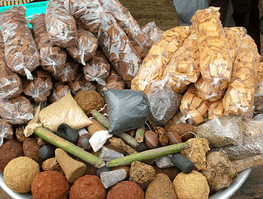Book on medicinal plants of Ghana launched
 A book that seeks to educate the public on the health benefits of plants has been launched in Accra.
A book that seeks to educate the public on the health benefits of plants has been launched in Accra.
The book, titled: “Common Medicinal Plants of Ghana,” contains 73 distinct species of plants and their medicinal value, as well as over 100 various diseases the plants could cure.
The 116-page book, co-authored by three plant researchers namely, Mr Tonny Asafo Agyei, Dr Kofi Bobi Barimah and Mr Okyere Bonna explores various plant species in Ghana and seeks to demystify the public’s perception about plant medicines to encourage their use.
Mr Asafo Agyei, Head of Plant Development Department, Center for Plant Medicine Research (CPMR), Mampong-Akwapim, in the Eastern Region, giving an overview of the book said plant medicine remained the oldest form of disease treatment by many in the country and sub-Saharan Africa.
He said over the past two decades, there had been an increase and acceptance use of plant medicine in Ghana.
The impact, he said, could be attributed to the recognition of the role of plant medicine in healthcare delivery by the government, Ministry of Health, and international organisations such as the World Health Organisation (WHO), as well as the application of science and technology in the production of plant medicines.
“The World Health Organisation reports that, about 21 million, that is, about 70 per cent of Ghanaians depend on plant medicine for managing or treating several disease conditions,” he said.
Despite this, Mr Agyei said, attempts to integrate plant medicine into the national healthcare delivery system had been slow.
Target action to ensure utilisation of medicinal plants has not received the needed prioritisation, he added.
This, he said, was largely because of a lack of clear understanding and knowledge about plant medicine by many Ghanaians.
The book, Mr Agyei said, was therefore to disseminate knowledge about some common plants in Ghana and their health benefits to encourage its use by modern medical practitioners.
He noted that, as part of efforts to speed up the mainstreaming of the use of plant medicine into the healthcare delivery, over 40 herbal units had been set up in some public hospitals across the country to give patients the option to choose their preferred type of treatment.
Mr Agyei said: “conscious effort has been undertaken to draw attention to the potency and acceptance of plant medicine into the formal health sector.”
Mr Agyei bemoaned the impact activities such as illegal mining, deforestation, and climate change, were having on the country’s rich plant diversity and urged authorities to do more to save the forests from further destruction.
Ms Horma Anna Miezah, Deputy Director General of the National Lottery Authority, who launched the book on behalf of Mr Samuel Awuku, the Director General of NLA, said the efficacy of plant medicines had been tested over the years, most recently during the outbreak of the COVID-19 pandemic.
She said the book would add to existing knowledge and practice of plant medicine in the country and preserve medicinal plants in Ghana and beyond.
She encouraged Ghanaians to accept plant medicine as part of disease treatment “There is nothing evil about plant medicine as sometimes are made to believe,” she said.
Dr Barimah, the Executive Director of CPMR and one of the authors said the publication of the book would make it easy for practitioners of herbal medicine and for individuals to be able to identify and recognize various herbal medicine plants.
He urged manufacturers of herbal medicine to adopt the book and use it as a guide to boost the efficacy of plant medicines.
Source: GNA
